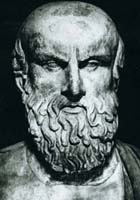The Battle Of Salamis Poem by Aeschylus
The Battle Of Salamis
The night was passing, and the Grecian host
By no means sought to issue forth unseen.
But when indeed the day with her white steeds
Held all the earth, resplendent to behold,
First from the Greeks the loud-resounding din
Of song triumphant came; and shrill at once
Echo responded from the island rock.
Then upon all barbarians terror fell,
Thus disappointed; for not as for flight
The Hellenes sang the holy pæan then,
But setting forth to battle valiantly.
The bugle with its note inflamed them all;
And straightway with the dip of plashing oars
They smote the deep sea water at command,
And quickly all were plainly to be seen.
Their right wing first in orderly array
Led on, and second all the armament
Followed them forth; and meanwhile there was heard
A mighty shout: "Come, O ye sons of Greeks,
Make free your country, make your children free,
Your wives, and fanes of your ancestral gods,
And your sires' tombs! For all we now contend!"
And from our side the rush of Persian speech
Replied. No longer might the crisis wait.
At once ship smote on ship with brazen beak;
A vessel of the Greeks began the attack,
Crushing the stem of a Phoenician ship.
Each on a different vessel turned its prow.
At first the current of the Persian host
Withstood; but when within the strait the throng
Of ships was gathered, and they could not aid
Each other, but by their own brazen bows
Were struck, they shattered all our naval host.
The Grecian vessels not unskillfully
Were smiting round about; the hulls of ships
Were overset; the sea was hid from sight,
Covered with wreckage and the death of men;
The reefs and headlands were with corpses filled,
And in disordered flight each ship was rowed,
As many as were of the Persian host.
But they, like tunnies or some shoal of fish,
With broken oars and fragments of the wrecks
Struck us and clove us; and at once a cry
Of lamentation filled the briny sea,
Till the black darkness' eye did rescue us.
The number of our griefs, not though ten days
I talked together, could I fully tell;
But this know well, that never in one day
Perished so great a multitude of men.
''The Persians'' (Persai) was performed in 472 BC and based on experiences in Aeschylus's own life, specifically the Battle of Salamis
Were things any better when poems served as the textbooks of history? Certainly they were no worse.
Were smiting round about; the hulls of ships, ..... well penned
A unique timeless poem by a unique poet who is immortal. Beautifully written with sublime imagery. To be reread many times to enjoy always.
This is a brilliant poem having touching inscription with nice theme.
The number of our griefs, not though ten days I talked together, could I fully tell; But this know well, that never in one day Perished so great a multitude of men. a very fine poem. tony
At first the current of the Persian host Withstood; but when within the strait the throng Of ships was gathered, and they could not aid Each other, but by their own brazen bows Were struck, they shattered all our naval host. great writing great 10+++++++++++++++++++++++++++++++++++++++++++
This poem has not been translated into any other language yet.
I would like to translate this poem
Now that was the way to send a message home about a battle